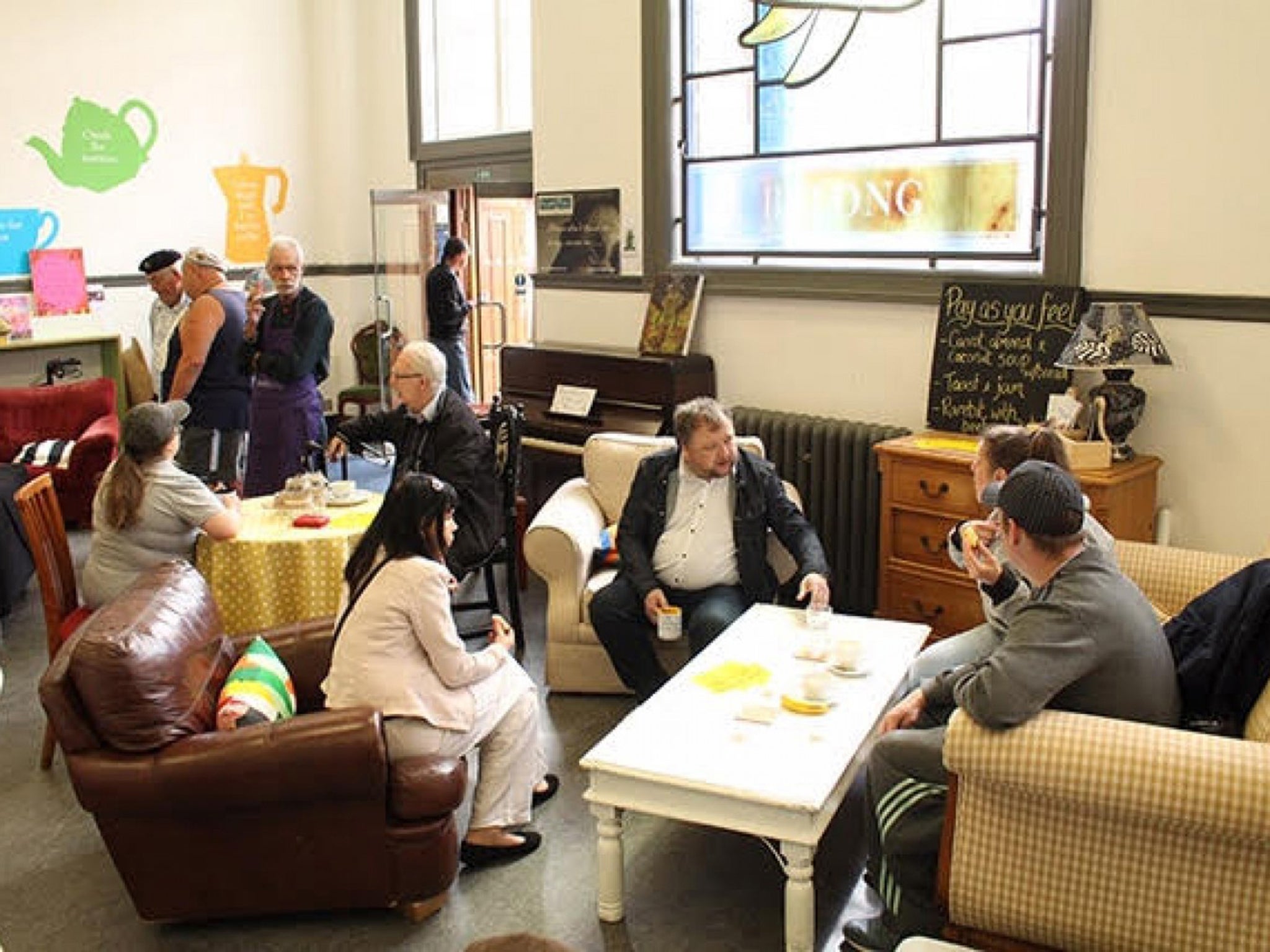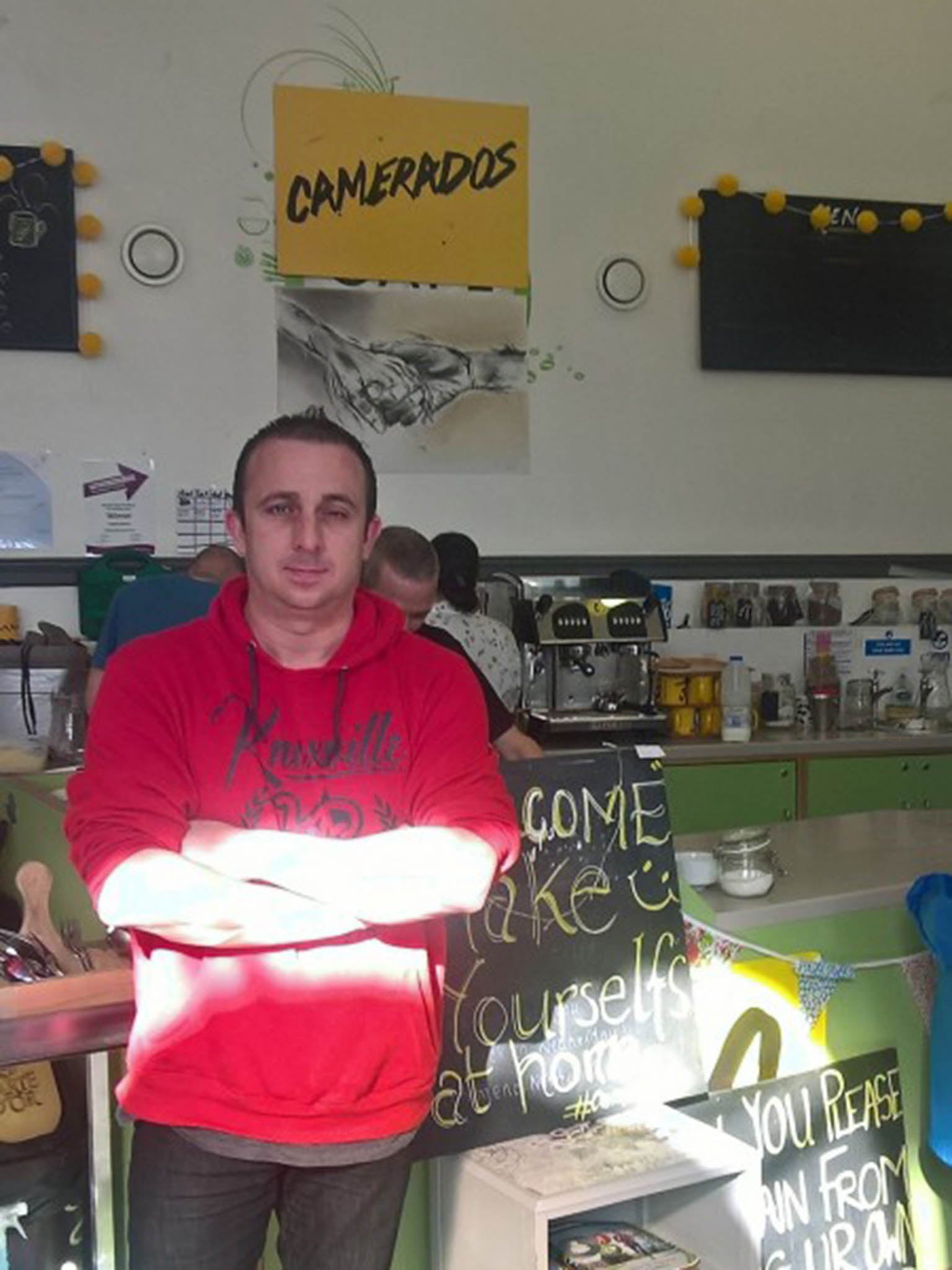A living room in a library helps people through their darkest times
Many who end up in homeless shelters often lack a support system to help them get through hard times. One initiative is aiming to counter that by providing a safe space where people who are feeling isolated can come together and find friendship

Inside a library in a depressed seaside town is a room converted into a cafe designed to look like a grandmother’s homey living room.
On any given day, there might be an elderly woman playing Scrabble with a man in his 20s. There might be a homeless man making coffee for a mother whose daughter recently died. Seated on the vintage-looking couches and armchairs there will be strangers sharing stories, offering counsel and friendship.
This community open space seeks to address the central issues that commonly lead to homelessness, addiction and poor health: Isolation and a lack of purpose.
It’s the brainchild of Maff Potts, who made his career working with charities for the homeless. But the work left him frustrated that, despite all their best efforts, they weren’t reducing homelessness. All the soup kitchens and all the shelters in the world only helped people once they’d already lost everything, rather than trying to address the issues that led to homelessness in the first place.
A root cause, he discovered, is that many people who ended up at the shelters were alone. Their relationships had broken down, they didn’t have a support system, they had no one to show them kindness – or to give kindness to.
Potts, 44, understands as well as anyone how altruism can heal. His parents both died within several years of each other when he was a young adult. That first year without either of them, he didn't know where to go to celebrate Christmas, so he spent the day volunteering at a homeless shelter.
“It was a wonderful, most noble environment and I loved it. I connected to it,” he said in an interview. “These feelings had helped me, more than I had helped them, to get through that first Christmas without my parents.”
Over the years during his work on homelessness, when he met people in their darkest moments, some talking openly about suicide, Potts began asking them to do him a favour. One man mentioned he’d been a painter, so Potts started talking about how the reception area could use redecorating and asked the man for his advice. The man ended up offering to repaint it himself. The task gave him a purpose, a reason to keep living.
“The thing that led to a lasting transformation was when they helped somebody else,” Potts said. “That was the magic moment.”
So Potts started thinking there must be a way to improve the lives of people who are struggling not by making them feel like they’re always recipients of charity, which can be demoralising, but by giving them a space to help others – and by extension, themselves.
So a year ago, Potts started his own nonprofit, Camerados, a word derived from “camaraderie,” which he defines as someone between a stranger and a friend. He opened a pop-up living room in a small town in the north. He advertised it as a place anyone could come, have a cuppa, and stay as long as they want in a judgment-free environment.
He then opened the permanent living room in a library in the seaside town of Blackpool, which has been rated among the least healthy in the country, where drug abuse, poor health and violence are widespread. They’re planning to try it out in larger areas like Oxford, and even London, and are hoping to cross the pond to bring the idea to New York City in 2017.
“The principle is that it’s a hub of kindness and purpose. We’re not saying, ‘Hey come in and we’ll fix your life.’ It's ‘Hey come in, sit down, have a chat with these folks.’ It’s the mutual aid concept,” he said. One way of looking at it, he said, is that when you’re in the living room you don’t know if you’re being helped or if you’re the helper and that’s empowering.

Potts has also teamed up with Jaclyn Lindsey, who just started a nonprofit called Kindness.org, where she’s hoping to inspire people to commit small acts of kindness. Based in Brooklyn, Lindsey is using grant money to help fund the Camerados living-room concept.
“We think people need a handout [and] we don’t give them the dignity of the option to participate,” Lindsey said. “How do you build a kinder world? What does that actually mean? People want to combat the hate in the world, the negativity.”
Charlie Howard, a clinical psychologist in London, has also signed on to help Potts develop Camerados. After years of treating patients in a traditional therapy setting, she sees his vision as more effective and more accessible for people who are struggling.
“We have a whole structure where we get boxed into being the helper or the helped,” she said. “In our friendships we move between the two, and there's something about that that is real and the way we help people [in need] isn't real. These people have so many things to give, but they are often thought of as a problem that needs to be fixed.”
This was true for Gary Phillips, a 37-year-old with a college degree in journalism, who lost everything – his job, his home, his friends – because of his alcohol addiction. After he went through rehab and stopped drinking last year, he isolated himself from the world. He became deeply depressed and said he did not leave his apartment for almost six months, except to go food shopping.
On one of those rare ventures out, he bumped into a woman who had worked at the rehab who told him about the new open living room in Blackpool. She asked him to stop by on its opening night.
“It was quite uncomfortable because I hadn't been in that situation in a long time,” he said. “But slowly when the living room opened on a daily basis I would go in, sometimes I would only stay five minutes, but for me it was getting back out.”
And he kept coming back. Soon he was the one welcoming patrons to the room, engaging them in conversation. Knowing his background in media, Potts asked Phillips to help run the living room's social media, so Phillips started a Twitter account and a Facebook page and has been maintaining them. Now, he's decided he’d like to do social media work full-time.
“It’s given me a passion and drive to get my life back,” he said. “I’ve got something I know I can do. Camerados has given me the trust to do it.”
This is why Howard says the living-room approach is more effective than an hour of traditional talk therapy.
“Feeling empowered and valued is essential to our mental health. I think we are on to something that is really different and it spins help services on its head,” she said. “In a living room I'm able to offer support when people want it. The most effective thing is to be alongside people, to help each other. I can ask their help, they can ask me for advice. It's much more human.”
© The Washington Post
Join our commenting forum
Join thought-provoking conversations, follow other Independent readers and see their replies
Comments
Bookmark popover
Removed from bookmarks